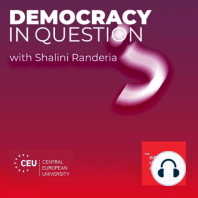25 min listen
The Right to Belong
ratings:
Length:
31 minutes
Released:
Nov 24, 2021
Format:
Podcast episode
Description
Glossary Who is Hannah Arendt?(00: 2: 08 or page 1)Hannah Arendt (1906–1975) was one of the most influential political philosophers of the twentiethcentury. Born into a German-Jewish family, she was forced to leave Germany in 1933 and lived inParis for the next eight years, working for a number of Jewish refugee organisations. In 1941 sheimmigrated to the United States and soon became part of a lively intellectual circle in New York. Sheheld a number of academic positions at various American universities until her death in 1975. She isbest known for two works that had a major impact both within and outside the academiccommunity. The first, The Origins of Totalitarianism, published in 1951, was a study of the Nazi andStalinist regimes that generated a wide-ranging debate on the nature and historical antecedents ofthe totalitarian phenomenon. Source Who are the Chakma refugees?(00:6:41 or page 2)The Chakmas are ethnic people who lived in the Chittagong Hill Tracts, most of which arelocated in Bangladesh. Chakmas are predominantly Buddhists, they are found in northeastIndia, West Bengal, Bangladesh, and Myanmar.The Chakmas living in India are Indian citizens,some of them, mostly from Mizoram, live in relief camps in southern Tripura due to tribalconflict with Mizos. Source What is the 1951 Convention?(00:25:25 or page 5)The 1951 Convention relating to the Status of Refugees, as complemented by its 1967 Protocol, hasjustly been termed the “Magna Carta” of refugees. The Convention and Protocol are, indeed, theculmination of an uninterrupted effort by the international community, started under the League ofNations in 1921, to ensure the international recognition of some basic rights and of certain minimumstandards of treatment for persons forced to flee their country in order to escape persecution onaccount of their race, religion, nationality, political opinion or membership of a particular socialgroup. The fundamental importance of the 1951 Convention and 1967 Protocol was stressed by theWorld Conference on Human Rights held in Vienna in 1993, and has been repeatedly affirmed by theGeneral Assembly of the United Nations, which has hailed the Convention and Protocol as “thecornerstone of the international system for the protection of refugees”.The Executive Committee ofUNHCR has also emphasised the primacy of these instruments, and confirmed that they form theinternational legal basis for the protection of refugees. Source
Released:
Nov 24, 2021
Format:
Podcast episode
Titles in the series (77)
When and how is power visible in politics? by Democracy in Question?
